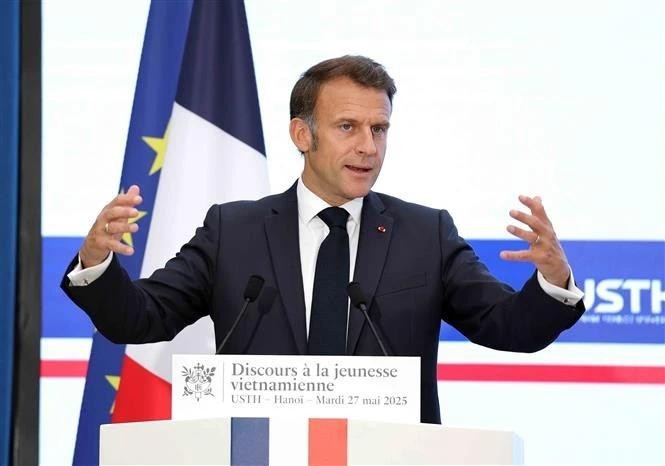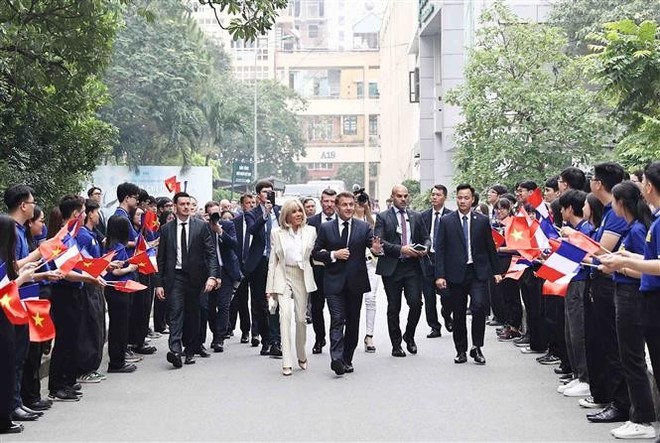
The University is a flagship institution founded under bilateral agreements signed between the Vietnamese and French governments in 2009 and 2018.
President Macron highlighted that USTH is now ranked fifth nationwide for research output and has forged strong collaborations in science and technology with top French academic and research institutions. He also noted that France has to date trained over 15,000 Vietnamese engineers, more than 3,000 doctors, and thousands of legal experts.
The French President, who is paying a state visit to Vietnam from 25-27, underlined the central role of education in the France–Vietnam partnership, which he described as one of the most enduring pillars of bilateral cooperation.
President Macron highlighted that USTH is now ranked fifth nationwide for research output and has forged strong collaborations in science and technology with top French academic and research institutions. He also noted that France has to date trained over 15,000 Vietnamese engineers, more than 3,000 doctors, and thousands of legal experts.
He affirmed that education, built on mutual trust and shared values, will remain a vital foundation of the France–Vietnam relationship. President Macron further announced that a new bilateral agreement on education is set to be signed, aiming to deepen academic ties and boost joint research and training initiatives.
President Macron mentioned the turbulent global landscape, describing it as a period of profound transformation unlike anything experienced by his generation. He pointed to escalating geopolitical tensions, with conflicts erupting in multiple regions and growing threats to national sovereignty and territorial integrity.
International rules and legal norms that once underpinned cooperation are increasingly being disregarded, raising alarm over maritime freedom and territorial claims. At the same time, trade policies and tariffs are becoming more volatile.
Against this backdrop, the President emphasized that the relations between Vietnam and France, as well as between ASEAN and the European Union, have received more attention than ever.
He affirmed that France and Vietnam share common interests in promoting geopolitical balance, peace, and security. In the face of mounting global uncertainties, he emphasized the need for both countries to pursue a shared goal—rebuilding cooperative international relations rooted in peace and shared prosperity.
To this end, the French President stressed the importance of deepening collaboration in key areas, including education, science and technology, innovation, healthcare, and defense. Strengthening these sectors, he noted, will help both nations reduce their reliance on other regions, foster greater autonomy, and advance global freedom.

President Macron also underlined the need for joint efforts to achieve sustainable prosperity, combat climate change, and prevent further biodiversity loss, calling this a vital mission for the future of humanity. Describing Vietnam as a major economy among the middle-income countries, the President stressed that the Southeast Asian nation's future development hinges on how its young generation, scientists, and researchers tackle the defining challenges in a volatile era, such as raising climate change awareness, reducing greenhouse gas emissions, and protecting ecosystems.
It is a must to ensure economic growth while protecting ecosystems and developing clean, green, and sustainable economic models to achieve carbon neutrality by 2050, moving towards cleaner and greener production and consumption, President Macron stated, identifying this as a pillar of the Vietnam-France cooperation.
Touching on the application of advanced technologies and AI, he underscored that while AI can help humans move faster and stronger, it cannot replace human intelligence entirely. France seeks to work with Vietnam in the domains of AI, renewable energy, digital technology, robotics, and automation, the leader stressed.
France, he added, is committed to continuing its support for talent development in Vietnam, with plans to double the number of student exchanges between the two countries until 2030.
President Macron openly engaged with questions raised by Vietnamese students and intellectuals covering technology transformation, skill development for young people, support for Vietnamese students studying in France, and architectural cooperation between the two nations.
On the occasion, President Macron, along with Vietnamese State Vice President Vo Thi Anh Xuan and high-level delegations from both countries, pressed the buttons to kick off the construction of the VNVC vaccine and bioproducts plant, which will be Vietnam's largest and most modern vaccine manufacturing establishment.
Built at an initial cost of some VND2 trillion (US$77.16 million), the factory is designed to span more than 26,000 square meters in Phu An Thanh Industrial Park, Ben Luc district, the Mekong Delta province of Long An. The plant will operate in accordance with the highest international Good Manufacturing Practice (GMP) standards, including EU GMP (Europe), FDA GMP (the US), and WHO GMP (World Health Organization).
The factory will also strictly comply with Good Laboratory Practice standards and international standards for safety, welfare, and humane treatment in laboratory animal research areas, adhering to international scientific ethics principles alongside numerous other advanced standards for environmental protection, emission reduction, and compliance with green factory and smart factory construction technologies.
When it is put into operation by the end of 2027, the factory is expected to gradually produce high-quality vaccines from Sanofi (France), thereby meeting the substantial demand for high-quality, affordable “Make in Vietnam” vaccines for the domestic market while positioning for export to regional countries.
























